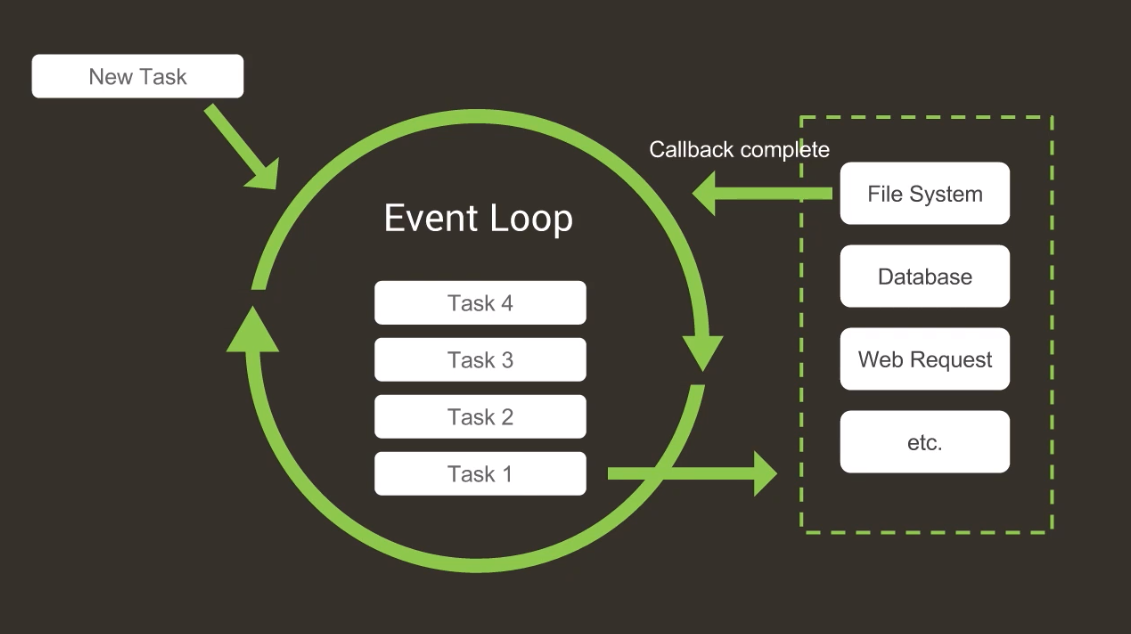Node.js is a popular open-source, cross-platform runtime environment that is widely used for server-side programming. One of the key features of Node.js is its event-driven, non-blocking I/O model, which is implemented using an event loop. In this article, we'll take a deep dive into the Node.js event loop, how it works, and why it's important.

What is an event loop?
An event loop is a programming construct that waits for and dispatches events or messages in a program. It is typically used to implement non-blocking I/O, which allows a program to perform other tasks while waiting for I/O operations to complete. The event loop is an essential part of Node.js, and it is what allows Node.js to handle many simultaneous connections efficiently.
How does the Node.js event loop work?
The Node.js event loop is a single-threaded loop that listens for events and executes callback functions associated with those events. When an I/O operation is initiated, such as reading from a file or making a network request, it is placed in a queue. The event loop continuously checks this queue for events that are ready to be processed.
When an event is ready, the event loop invokes its associated callback function. Callback functions are functions that are passed as arguments to other functions and are called when the parent function completes its operation. In the context of Node.js, a callback function is typically used to handle the completion of an I/O operation.
The callback function is executed synchronously, and any subsequent I/O operations are also placed in the queue. If the queue becomes empty, the event loop will wait for new events to arrive.
Why is the Node.js event loop important?
The Node.js event loop is critical for building scalable, high-performance applications. By using an event-driven, non-blocking I/O model, Node.js can handle many simultaneous connections with a single thread, making it more efficient than traditional server-side technologies such as Apache and PHP.
In addition, the event loop allows developers to write code in a more natural, asynchronous style. Instead of writing blocking code that waits for I/O operations to complete, developers can write non-blocking code that allows the event loop to handle other tasks while waiting for I/O operations to finish. This leads to faster, more responsive applications and a better user experience.
Conclusion
In conclusion, the Node.js event loop is a fundamental part of the Node.js runtime environment. It allows Node.js to handle many simultaneous connections efficiently and provides developers with a more natural, asynchronous programming model. Understanding how the event loop works is essential for building scalable, high-performance applications with Node.js.

What is an event loop?
An event loop is a programming construct that waits for and dispatches events or messages in a program. It is typically used to implement non-blocking I/O, which allows a program to perform other tasks while waiting for I/O operations to complete. The event loop is an essential part of Node.js, and it is what allows Node.js to handle many simultaneous connections efficiently.
How does the Node.js event loop work?
The Node.js event loop is a single-threaded loop that listens for events and executes callback functions associated with those events. When an I/O operation is initiated, such as reading from a file or making a network request, it is placed in a queue. The event loop continuously checks this queue for events that are ready to be processed.
When an event is ready, the event loop invokes its associated callback function. Callback functions are functions that are passed as arguments to other functions and are called when the parent function completes its operation. In the context of Node.js, a callback function is typically used to handle the completion of an I/O operation.
The callback function is executed synchronously, and any subsequent I/O operations are also placed in the queue. If the queue becomes empty, the event loop will wait for new events to arrive.
Why is the Node.js event loop important?
The Node.js event loop is critical for building scalable, high-performance applications. By using an event-driven, non-blocking I/O model, Node.js can handle many simultaneous connections with a single thread, making it more efficient than traditional server-side technologies such as Apache and PHP.
In addition, the event loop allows developers to write code in a more natural, asynchronous style. Instead of writing blocking code that waits for I/O operations to complete, developers can write non-blocking code that allows the event loop to handle other tasks while waiting for I/O operations to finish. This leads to faster, more responsive applications and a better user experience.
Conclusion
In conclusion, the Node.js event loop is a fundamental part of the Node.js runtime environment. It allows Node.js to handle many simultaneous connections efficiently and provides developers with a more natural, asynchronous programming model. Understanding how the event loop works is essential for building scalable, high-performance applications with Node.js.
Tags
Architecture
